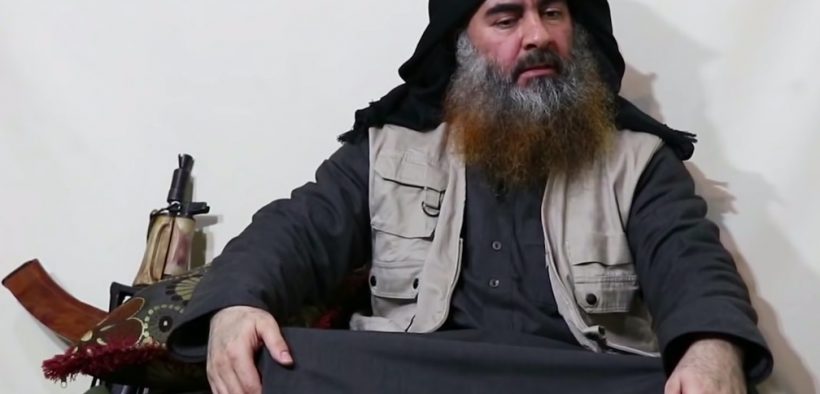Why Was ISIS Leader Killed In US Raid Just Miles From Turkey?

“On behalf of every Muslim I know…every Muslim watching…good riddance to Abu Bakr Al Baghdadi.”
The leader of ISIS, Abu Bakr al-Baghdadi, was killed in a US operation in northern Syria on Saturday night only a few miles from the Turkish border raising questions about his ties to Turkey.
The Operation That Killed Al-Baghdadi
President Trump gave a graphic description of al-Baghdadi’s death in a Sunday morning news conference:
“He died after running into a dead-end tunnel, whimpering and crying and screaming. The compound had been cleared by this time, with people either surrendering or being shot and killed. Eleven young children were moved out of the house un-injured. The only ones remaining were Baghdadi in the tunnel, who had dragged three children with him to certain death. He reached the end of the tunnel, as our dogs chased him down. He ignited his vest, killing himself and the three children. His body was mutilated by the blast, but test results gave certain and positive identification.”
Al-Baghdadi’s death is a major symbolic blow to ISIS, which remains active, but scattered, after holding nearly a third of Syria and Iraq as a self-proclaimed caliphate at its peak. Al-Baghdadi declared himself the caliph of the ruthless terrorist organization, which was denounced by even al-Qaida for its sadistic practices.
No US soldiers were hurt in the operation, which Trump described as “impeccable.”
US national security adviser Robert O’Brien said the raid will be named after Kayla Mueller, a humanitarian who was captured by the terrorist group, tortured, and sexually abused by Baghdadi before dying in ISIS confinement at the age of 26.
“I am grateful to our president and brave troops for finding ISIS leader Al-Bagdadi,” said Diane Foley, whose son James was among the American hostages murdered by ISIS. “I hope this will hinder the resurgence of terror groups and pray that captured Isis fighters will be brought to trial and held accountable.”
Trump mentioned the Americans who were killed by ISIS at the press conference, and thanked the Kurds, Russia, Iraq, Turkey, and even Syria’s Assad dictatorship for providing unspecified aid in the mission.
“For five months there has been joint intel cooperation on the ground and accurate monitoring, until we achieved a joint operation to kill Abu Bakir al-Bagdadi,” Kurdish commander Mazloum Abdi tweeted. “Thanks to everybody who participate in this great mission.”
Turkey And ISIS
The location of the raid was Idlib, a city curiously close to the Turkish border.
“A big question is what was Baghdadi doing apparently in a hideout less than five kilometers from Turkey’s border? In a province Turkey ostensibly controls and maintains with military outposts,” asked diplomat Brett McGurk, as per the New Yorker’s Robin Wright.
During ISIS’s peak, oil smuggling was the terrorist group’s main source of revenue. “Widespread reports” have shown that the contraband oil was sold in Turkey, with government officials such as President Erdogan’s son-in-law allegedly involved in the illegal trade, as reported by Foreign Policy’s Ahmet Yayla and Colin Clarke.
“There are many more examples of Turkey’s passive support to Islamic State fighters, including wounded Islamic State militants treated for free at hospitals across southeastern Turkey,” wrote Clarke and Yayla. “Among those receiving care was one of the top deputies of Islamic State chieftain Abu Bakr al-Baghdadi, Ahmet el-H, who was treated in a private hospital in Sanliurfa in August 2014.”
Turkey has also recruited jihadist fighters for its massacre of the US-allied Kurds in recent weeks. The Kurds, who were the frontline fighters against ISIS and continue to help fight against the terrorist group, were abandoned by President Trump after a call with Erdogan earlier this month. Hundreds of ISIS prisoners guarded by the Kurds have escaped in the wake of Turkey’s assault on northern Syria.
Turkey is not alone among governments that hold questionable relations with the terrorist organization. As a leaked WikiLeaks email from 2014 shows, Hillary Clinton told campaign manager John Podesta of the need to pressure “the governments of Qatar and Saudi Arabia, which are providing clandestine financial and logistic support to ISIL and other radical Sunni groups in the region.”
Will Al-Baghdadi’s Death Make A Difference?
While the death of one of the most ruthless terrorists in modern history has been widely celebrated, critics like Intercept columnist Mehdi Hasan are concerned that without addressing the underlying political issues and power vacuums in the Middle East, jihadist groups like ISIS will continue to operate.
Hasan cast doubt on Sen. Graham’s claim that al-Bagdadi’s death would be a “game changer” in the region, noting how the death of ISIS architect al-Zarqawi in 2010 failed to stop the growth of the terrorist group, which held territory the size of Portugal and contained 8 million people in its peak.
“We don’t know how its going to play out. The experts say that when a terrorist leader is killed, it could set back the group in the longterm, but in the short term it actually could make the group more deadly as they try to plan revenge attacks,” said Hasan told MSNBC on Sunday.
Hasan criticized the president for his rhetoric and Muslim ban, noting that ISIS recruiters use Trump’s speeches to bolster their “clash of civilizations” narrative of the West’s hatred towards Islam. But despite his concern that ISIS will survive, Hasan agreed that al-Baghdadi’s death is a huge symbolic blow to the terrorist organization.
“On behalf of every Muslim I know…every Muslim watching…good riddance to Abu Bakr Al Baghdadi,” Hasan told MSNBC. “Here is a man whose primary victims were Muslims, who was loathed by Muslims…The world is a a better place…Good riddance to this piece of human scum.”







